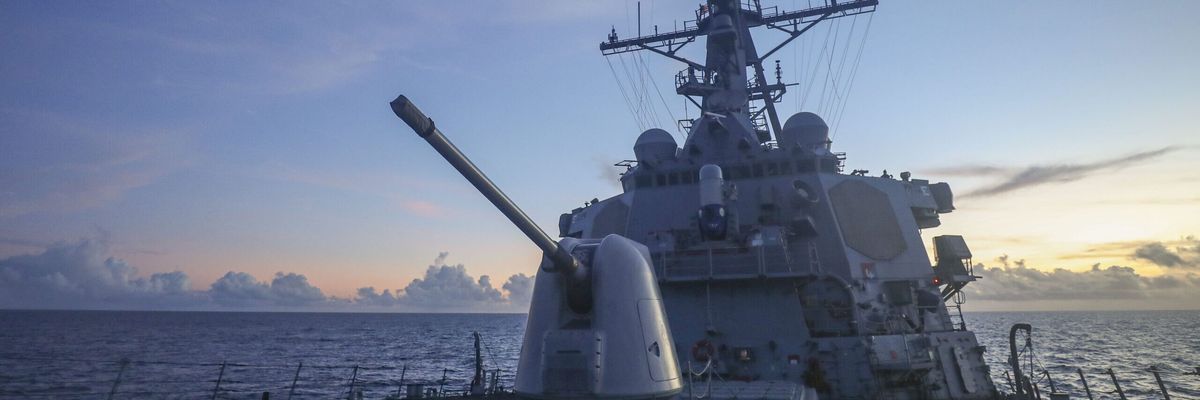As the United States tries to navigate a new world order in which China has emerged as its primary competitor and at times rival, hawks in Washington, the weapons industry, and other financially or politically interested parties are seeking to base that relationship on fear, confrontation, and animosity rather than healthy competition and cooperation.
A seemingly unwitting ally in that pursuit is the U.S. mainstream media, and a recent NBC Nightly News segment perfectly illustrates its usefulness in the hawks’ endeavor.
The story focused on a recent joint Chinese-Russian naval exercise near the Alaska coast and it had all the elements to lead one to the conclusion that only a more militaristic and confrontational posture would be the most appropriate response.
First, hype the threat. Anchor Peter Alexander set the story up as “just the latest close call” between Russia and China and the U.S. without saying exactly what the close call was.
NBC reporter Aaron Gilchrist then said the military exercises were “being called an incursion” without saying just who was saying that, and later he referred to the drill as an “aggressive maneuver” without describing what was aggressive about it. In fact, Gilchrist even acknowledged that the Russian and Chinese navies “never entered U.S. waters.”
Second, the segment completely ignored the wider context and the complexities of U.S.-China and U.S.-Russia relations, which could have helped to explain Russian and Chinese motives for conducting these drills so close to American territory, including the possibility that they were responding to similar U.S. military activity close to their own respective countries.
And lastly, this all led to the idea that more money for the Pentagon is in order. “Alaska senators today (are) renewing calls for increased investment in military power in Alaska,” Gilcrhist said — without any examination of whether that is even necessary.
A spokesman for U.S. Northern Command said that U.S. military assets were deployed “to assure the defense of the United States and Canada” and that the Russian and Chinese patrol “remained in international waters and was not considered a threat.” That description of events stands in stark contrast to NBC’s Alexander and Gilchrist calling it a “close call,” “an incursion,” and an “aggressive maneuver.” And NORTHCOM’s statement in no way implies that the military needs more assets to address the issue.
(This also isn’t the first time Russian and Chinese naval vessels have patrolled the region and it isn’t the first time NBC Nightly News has hyped the China threat.)
Quincy Institute Research Fellow Jake Werner, whose expertise focuses on U.S.-China relations, called the NBC story “an unusually glaring example of ostensibly independent U.S. media uncritically adopting” a militaristic approach to the world.
“An even-handed approach would have noted that the U.S. is doing the same thing (with greater frequency) and that China doing so is part of an escalatory action–reaction dynamic to which the U.S. is very much also contributing,” Werner told RS. “Instead, China's action is an ‘aggressive maneuver,’ while examples of the U.S. doing the same thing are actually featured — but without the necessary context and only to make the claim that China is aggressive.”
Indeed, Blake Herzinger, a research fellow at the United States Studies Center in Australia, agrees. According to CNN, he echoed NORTHCOM’s assessment that the Chinese and Russian naval exercise was not a threat and that they “acted according to international law just as U.S. Navy vessels do when operating off the Chinese or Russian coasts.”
But, he added, “Chinese responses to similar [American-led] operations in the Indo-Pacific … hype up imagined threats and broadcast their military response as efforts to eject invaders from their waters.”
So while both sides are threat-hyping these respective naval exercises, on the American side, it appears that the U.S. mainstream media is the one doing all the heavy lifting.














